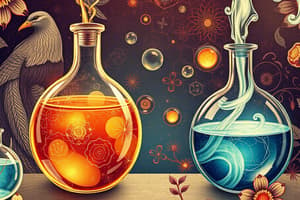Podcast
Questions and Answers
What is the main characteristic that distinguishes a chemical reaction from a physical change?
What is the main characteristic that distinguishes a chemical reaction from a physical change?
- No change in atoms
- Change in physical state
- Alteration in chemical makeup
- Formation of new substances (correct)
Which of the following is a key component of a chemical reaction responsible for undergoing transformation?
Which of the following is a key component of a chemical reaction responsible for undergoing transformation?
- Physical properties
- Products
- Reactants (correct)
- Chemical bonds
What happens to old bonds during a chemical reaction?
What happens to old bonds during a chemical reaction?
- They transform into new atoms
- They are broken (correct)
- They remain unchanged
- They are created
Which type of change involves altering the physical nature of a substance without changing its chemical makeup?
Which type of change involves altering the physical nature of a substance without changing its chemical makeup?
What is the primary outcome of a chemical reaction in terms of atoms involved?
What is the primary outcome of a chemical reaction in terms of atoms involved?
What type of reaction is represented by the combination of calcium oxide and water to form calcium hydroxide?
What type of reaction is represented by the combination of calcium oxide and water to form calcium hydroxide?
What is the chemical formula for the product formed when calcium oxide reacts with water?
What is the chemical formula for the product formed when calcium oxide reacts with water?
How is a solution of slaked lime, produced from the reaction with calcium oxide and water, used in whitewashing walls?
How is a solution of slaked lime, produced from the reaction with calcium oxide and water, used in whitewashing walls?
What is the end result of the reaction between calcium hydroxide and carbon dioxide in the air after whitewashing walls?
What is the end result of the reaction between calcium hydroxide and carbon dioxide in the air after whitewashing walls?
Which compound is chemically equivalent to the substance used in whitewashing walls?
Which compound is chemically equivalent to the substance used in whitewashing walls?
Flashcards are hidden until you start studying
Study Notes
Understanding Chemical Reactions
What is a Chemical Reaction?
A chemical reaction is a transformation of reactants into products due to the inherent instability of certain combinations of elements and compounds. In most cases, chemical reactions involve two or more interacting substances, known as reactants, which result in the formation of different substances, referred to as products. These interactions lead to the formation of new chemical bonds, while old bonds are broken, resulting in a net conversion of reactants into products. The key characteristic of a chemical reaction is that no new atoms are created or destroyed; only the arrangement of the atoms within the reactants changes to form the products.
Physical Changes vs. Chemical Changes
Physical changes, such as melting or dissolving, do not result in the creation of new substances. Rather, the physical nature of a substance changes without altering its chemical makeup. On the other hand, chemical changes involve the creation of new substances from the reactants, which are fundamentally different from the original reactants.
Key Components of Chemical Reactions
Reactants
Reactants are the substances that undergo chemical transformations in a reaction. They consist of elements and/or compounds that interact with each other to form products.
Products
Products are the substances created in a chemical reaction, which are typically different from the reactants. They are the result of the rearrangement of atoms within the reactants.
Chemical Bonds and Reactions
Chemical reactions are driven by the formation and breaking of chemical bonds between atoms. These bonds dictate the behavior and stability of molecules, playing a crucial role in determining whether a reaction will occur.
Coefficients and Balanced Equations
Coefficients are integer values assigned to the reactants and products in a chemical equation to balance the number of atoms and molecules on both sides of the reaction. Balanced equations are essential for accurately representing chemical reactions and reflecting the law of conservation of matter, which states that no atoms are created or destroyed during normal chemical reactions.
Studying That Suits You
Use AI to generate personalized quizzes and flashcards to suit your learning preferences.




